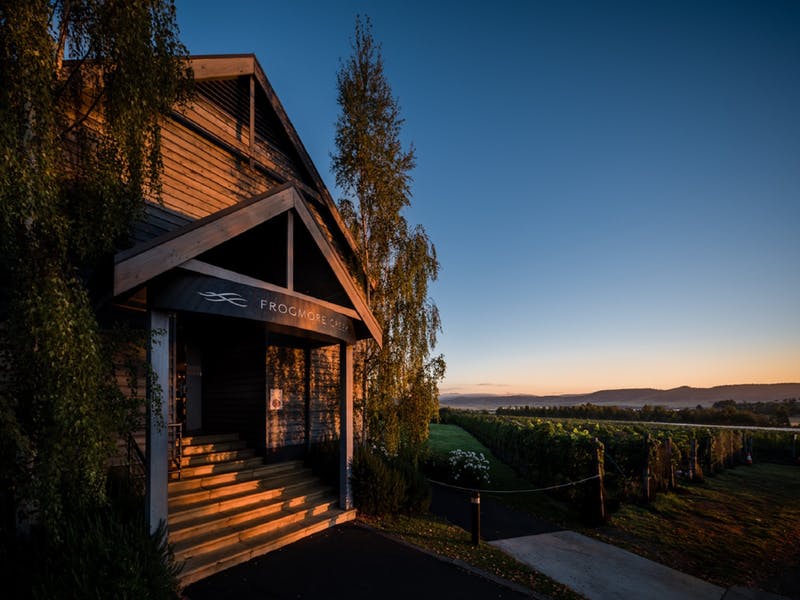The QUT Digital MBA Planning To Export Tassie’s Success To The World
With one foot firmly planted on Australia’s Apple Isle and a QUT Digital MBA in her hand, winery executive Shelley Bickerstaff has big plans for taking Tasmania’s successful community-based economy to the world.
As the National Brand and Marketing Manager for Frogmore Creek winery for the last eight years, Shelley has seen first-hand how small businesses working together can create something exceptional.
Located in the Coal River Valley, 20 minutes from Hobart, Frogmore Creek has evolved from a small winery to a diverse hospitality business that includes winemaking, a cellar door restaurant and The Lounge by Frogmore Creek bar and restaurant in Hobart.
The success of Frogmore Creek has mirrored the success of Tasmania, which has gone from economic laggard to one of Australia’s strongest economies in the space of just a few years.

“The last eight years have really been a great learning experience about what is possible if the community pulls together to create a destination,” she said. “Doing the program was really about formalising and extending that learning to help me take it to the next level.”
“In ten years, I want to be running my own successful business on a global scale from Tasmania.”
The “program” is the QUT Digital MBA of which Shelley is part the first cohort and about half way through the degree.
The MBA is the culmination of 20 years of on the job learning that has seen Shelley work in airline marketing, work for the Hilton hotel chain in the UK and manage an RSL in southern Tasmania.
Overcoming Fear
Having never completed formal qualifications since leaving school, Shelley had some trepidation about embarking on an academic pursuit, particularly one as rigorous as an MBA. Being a busy executive and mum to a seven-year-old added to her concerns about returning to the classroom.
“I think I underestimated how much I would love the experience of learning. I wasn’t prepared for how much I would really get into the content. Really craving the knowledge makes the work required seem a little easier,” she said.
“Even the finance subject, where I thought I would really struggle, was a great experience.”
The motivation to pursue a mid-career MBA was based on a “gut feeling” that she needed to fill a hole in her life experience.
“When I first read that QUT was bringing out an online MBA I was quite curious,” she said. “Then when I found out it would have very particular focus on the digital space I knew I had to do it.”
“The content really fits well with my current role and where I want to take my career in the future.. being able to learn remotely was also an important factor in choosing QUT.”
It also helps that Shelley is from Brisbane originally and the courses structure allows her to return home every ten weeks to visit family and undertake the voluntary two-day intensives that precede each course.
The QUT Digital MBA
The QUT Digital MBA comprises 12 separate, 10-week units which can all be completed in as little as two years. It is delivered entirely online and facilitated by a teaching team of academic experts, business coaches and personal engagement coaches.
Each 10-week long unit begins with an optional two-day weekend intensive workshop, or ‘calibration session’, hosted at QUT’s Executive Education Centre in the Brisbane CBD. These sessions allow students to explore the unit content and establish or reinforce cohort and QUT staff connections.
Shelley tries to get to every single intensive, and not just because she gets to see her family.
“The diversity of people doing the program and the opportunity to learn from their experience has been a real highlight,” she said. “We have people coming in from the mines and all sorts of other industries.”
A Program for Industry 4.0
The QUT Digital MBA was officially launched in late 2018 with the first cohort of students starting in early 2019 and now approaching the halfway mark of their degrees. The program is offered in addition to QUT’s existing triple-accredited traditional on-campus MBA and its highly ranked Executive MBA (EMBA).
The AMBA-accredited program has been specifically designed to enhance students’ capability to lead in an industry 4.0 context.
QUT MBA Director Associate Professor Glen Murphy said emerging digital business models presented an array of potential opportunities and risks for future business leaders.
“Without sufficient awareness or understanding of the nascent changes in ‘digital’ and ‘data’ strategic platforms, decision makers limit their organisations’ ability to achieve a sustainable competitive advantage and to continue delivering stakeholder value,” he said.
This is one of the reasons QUT has formed an exclusive five-year relationship with Boston’s MIT Sloan School of Management which will see more than 50 students, including Shelley, head to the United States later this year.
In September, the students from QUT’s MBA suite of programs will fly to Boston for the first two-week “MIT Immersion” tour, interacting with MIT faculty and alumni with a focus on Leadership, Entrepreneurship and Digital Transformation. Six of the Digital MBA cohort will be part of this revolutionary educational experience.
“We’ll be in the thick of the US election at the time so it should be an incredible opportunity to broaden my experience and get a real global viewpoint of business,” Shelley said.
Prospective students are encouraged to contact Tim Burton on + 61 7 3138 7731 or tim.burton@qut.edu.au






